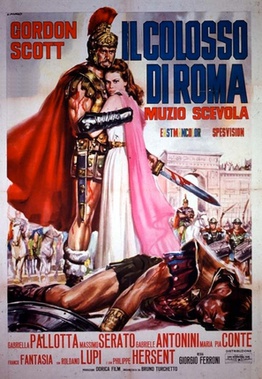
Gaius Mucius Cordus, better known with his later cognomen Scaevola, was an ancient Roman youth, possibly mythical, famous for his bravery.
Quintus Mucius Scaevola Augur was a politician of the Roman Republic and an early authority on Roman law. He was first educated in law by his father and in philosophy by the stoic Panaetius of Rhodes.
Quintus Mucius Scaevola may refer to one of the following politicians of the Roman Republic:
Quintus Mucius Scaevola "Pontifex" was a politician of the Roman Republic and an important early authority on Roman law. He is credited with founding the study of law as a systematic discipline. He was elected Pontifex Maximus, as had been his father and uncle before him. He was the first Roman Pontifex Maximus to be murdered publicly, in Rome in the temple of the Vestal Virgins, signifying a breakdown of historical norms and religious taboos in the Republic.
Quintus Mucius Scaevola was a politician of the Roman Republic. He was made praetor in 215 BC, and became governor of Sardinia, a post that was extended twice, first for two years, and then for another year.
Quintus Mucius Scaevola was a politician of the Roman Republic, believed to be the son of his namesake who was praetor in 215 BC. He was made praetor in 179 BC, and became governor of Sicily. In 174 BC, he was made consul, and in 171 BC, tribune. In this latter position, he accompanied his brother-in-law Publius Licinius Crassus on campaign against Perseus of Macedonia.
Publius Licinius Crassus Dives Mucianus was the natural son of Publius Mucius Scaevola and Licinia, and brother of Publius Mucius Scaevola. He was adopted at an unknown date by Publius Licinius Crassus, his mother's brother, or by a son of the consul of 205 BC, Publius Licinus Crassus Dives.
Publius Mucius Scaevola was a prominent Roman politician and jurist who was consul in 133 BC. In his earlier political career he served as tribune of the plebs in 141 BC and praetor in 136 BC. He also held the position of pontifex maximus for sixteen years after his consulship. He died around 115 BC.

Laelius de Amicitia is a treatise on friendship (amicitia) by the Roman statesman and author Marcus Tullius Cicero, written in 44 BC.

Muzio Scevola is an opera seria in three acts about Gaius Mucius Scaevola. The Italian-language libretto was by Paolo Antonio Rolli, adapted from a text by Silvio Stampiglia. The music for the first act was composed by Filippo Amadei, the second act by Giovanni Bononcini, and the third by George Frideric Handel. Collaborations of groups of composers were common in the 18th century, though this is the only one done in London. Bononcini had written the music for two earlier treatments of this story on his own, works dating from 1695 and 1710.
Licinia is the name used by ancient Roman women of the gens Licinia.
Gaius Laelius Sapiens, was a Roman statesman, best known for his friendship with the Roman general and statesman Scipio Aemilianus. He was consul of 140 BC, elected with the help of his friend, by then censor, after failing to be elected in 141 BC. Gaius Laelius Sapiens was the son and heir of the Punic War general Gaius Laelius, himself consul in 190 BC. This Laelius had been former second-in-command and long-time friend, since childhood, of the Roman general and statesman Scipio Africanus. The younger Laelius was apparently born around 188 BC, after his father had become consul but had failed to win command of the campaign against Antiochus III the Great of Syria, which would have made him a rich man. His mother's name is unknown.

The gens Mucia was an ancient and noble patrician house at ancient Rome. The gens is first mentioned at the earliest period of the Republic, but in later times the family was known primarily by its plebeian branches.

Hero of Rome is a 1964 sword and sandal film set in Rome in 508 BC, and depicts the expulsion of the last kings of Rome and the legend of Gaius Mucius Scaevola.

Horatius Coclès is an opera in one act and nine scenes by the French composer Étienne Nicolas Méhul with a libretto by Antoine-Vincent Arnault. It was first performed at the Paris Opéra on 18 February 1794. It is based on the Roman legend of Horatius Cocles.
Scaevola or Scævola may refer to:

Mucius Scaevola before Lars Porsenna is a c.1618-1620 painting by Rubens and his pupil Antony van Dyck. It was painted for the Spanish royal court and remained in the royal collection in Madrid until the second half of the 18th century. It was then acquired by prince Kaunitz of Vienna and then in 1820 for the Esterhazy collection. It is now in the Museum of Fine Arts (Budapest). Its subject is drawn from Livy 2:12 and its account of Mucius Scaevola's bravery before Lars Porsenna after the former's failed attempt to assassinate the latter.

Giovanni Maria Mosca or Giovanni Padovano was an Italian Renaissance sculptor and medallist, active between 1515 and 1573, initially in the Veneto and after 1529 in Poland, where his first name was rendered Jan.
Publius Mucius Scaevola was a Roman politician and general.
Publius Mucius Scaevola may refer to:








